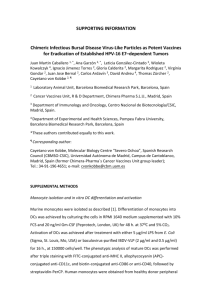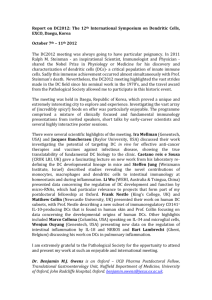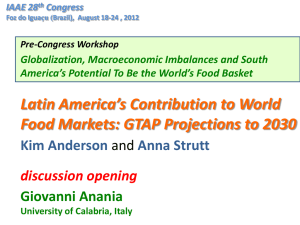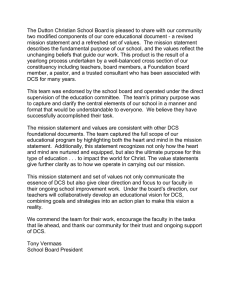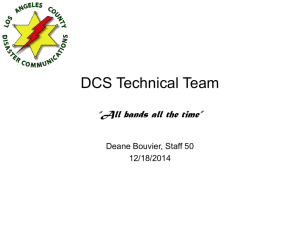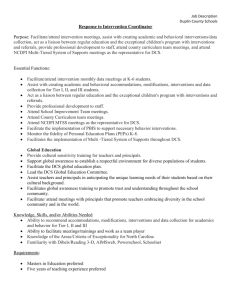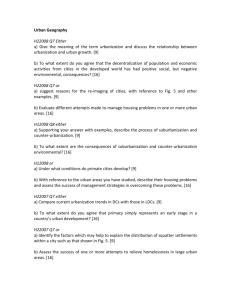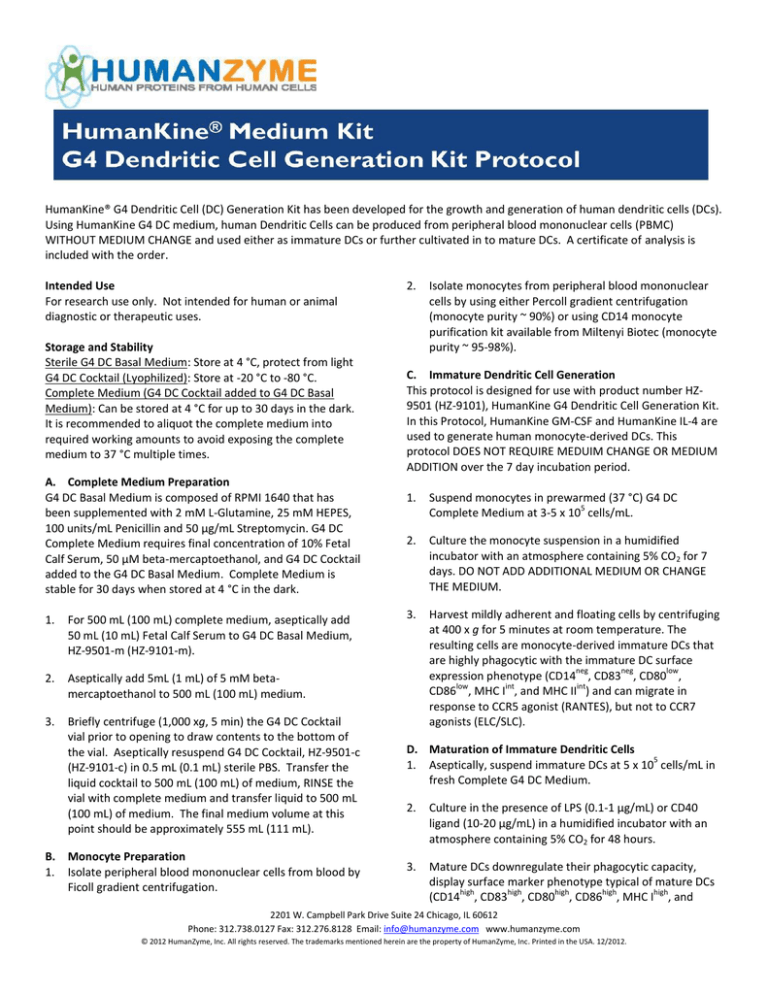
HumanKine® G4 Dendritic Cell (DC) Generation Kit has been developed for the growth and generation of human dendritic cells (DCs).
Using HumanKine G4 DC medium, human Dendritic Cells can be produced from peripheral blood mononuclear cells (PBMC)
WITHOUT MEDIUM CHANGE and used either as immature DCs or further cultivated in to mature DCs. A certificate of analysis is
included with the order.
Intended Use
For research use only. Not intended for human or animal
diagnostic or therapeutic uses.
Storage and Stability
Sterile G4 DC Basal Medium: Store at 4 °C, protect from light
G4 DC Cocktail (Lyophilized): Store at -20 °C to -80 °C.
Complete Medium (G4 DC Cocktail added to G4 DC Basal
Medium): Can be stored at 4 °C for up to 30 days in the dark.
It is recommended to aliquot the complete medium into
required working amounts to avoid exposing the complete
medium to 37 °C multiple times.
A. Complete Medium Preparation
G4 DC Basal Medium is composed of RPMI 1640 that has
been supplemented with 2 mM L-Glutamine, 25 mM HEPES,
100 units/mL Penicillin and 50 μg/mL Streptomycin. G4 DC
Complete Medium requires final concentration of 10% Fetal
Calf Serum, 50 μM beta-mercaptoethanol, and G4 DC Cocktail
added to the G4 DC Basal Medium. Complete Medium is
stable for 30 days when stored at 4 °C in the dark.
1.
For 500 mL (100 mL) complete medium, aseptically add
50 mL (10 mL) Fetal Calf Serum to G4 DC Basal Medium,
HZ-9501-m (HZ-9101-m).
2.
Aseptically add 5mL (1 mL) of 5 mM betamercaptoethanol to 500 mL (100 mL) medium.
3.
Briefly centrifuge (1,000 xg, 5 min) the G4 DC Cocktail
vial prior to opening to draw contents to the bottom of
the vial. Aseptically resuspend G4 DC Cocktail, HZ-9501-c
(HZ-9101-c) in 0.5 mL (0.1 mL) sterile PBS. Transfer the
liquid cocktail to 500 mL (100 mL) of medium, RINSE the
vial with complete medium and transfer liquid to 500 mL
(100 mL) of medium. The final medium volume at this
point should be approximately 555 mL (111 mL).
B. Monocyte Preparation
1. Isolate peripheral blood mononuclear cells from blood by
Ficoll gradient centrifugation.
2.
Isolate monocytes from peripheral blood mononuclear
cells by using either Percoll gradient centrifugation
(monocyte purity ~ 90%) or using CD14 monocyte
purification kit available from Miltenyi Biotec (monocyte
purity ~ 95-98%).
C. Immature Dendritic Cell Generation
This protocol is designed for use with product number HZ9501 (HZ-9101), HumanKine G4 Dendritic Cell Generation Kit.
In this Protocol, HumanKine GM-CSF and HumanKine IL-4 are
used to generate human monocyte-derived DCs. This
protocol DOES NOT REQUIRE MEDUIM CHANGE OR MEDIUM
ADDITION over the 7 day incubation period.
1.
Suspend monocytes in prewarmed (37 °C) G4 DC
5
Complete Medium at 3-5 x 10 cells/mL.
2.
Culture the monocyte suspension in a humidified
incubator with an atmosphere containing 5% CO 2 for 7
days. DO NOT ADD ADDITIONAL MEDIUM OR CHANGE
THE MEDIUM.
3.
Harvest mildly adherent and floating cells by centrifuging
at 400 x g for 5 minutes at room temperature. The
resulting cells are monocyte-derived immature DCs that
are highly phagocytic with the immature DC surface
neg
neg
low
expression phenotype (CD14 , CD83 , CD80 ,
low
int
int
CD86 , MHC I , and MHC II ) and can migrate in
response to CCR5 agonist (RANTES), but not to CCR7
agonists (ELC/SLC).
D. Maturation of Immature Dendritic Cells
5
1. Aseptically, suspend immature DCs at 5 x 10 cells/mL in
fresh Complete G4 DC Medium.
2.
Culture in the presence of LPS (0.1-1 μg/mL) or CD40
ligand (10-20 μg/mL) in a humidified incubator with an
atmosphere containing 5% CO2 for 48 hours.
3.
Mature DCs downregulate their phagocytic capacity,
display surface marker phenotype typical of mature DCs
high
high
high
high
high
(CD14 , CD83 , CD80 , CD86 , MHC I , and
2201 W. Campbell Park Drive Suite 24 Chicago, IL 60612
Phone: 312.738.0127 Fax: 312.276.8128 Email: info@humanzyme.com www.humanzyme.com
© 2012 HumanZyme, Inc. All rights reserved. The trademarks mentioned herein are the property of HumanZyme, Inc. Printed in the USA. 12/2012.
high
MHC II ) and migrate in response to CCR7 agonists
(ELC/SLC), but not to CCR5 agonist (RANTES).
4.
Alternatively, maturation can be induced by adding 100
U/mL HumanKine TNF alpha (Cat. No. HZ-1014, typical
ED50 0.05 – 5 ng/mL).
References:
1. Romani et al. 1994. J Exp Med 180:8393.
2. Yang D. et al. 2004. J Immunol. 173:6134-6142.
3. Tedder TF and Jansen PJ. 1997. Current Protocol in
Immunology. 7.32.1-7.32.6.
Limited Use and Restrictions
Unless otherwise stated in our catalog or other company
documentation accompanying the products sold by
HumanZyme Inc. are intended for research use only and are
not to be used for any other purpose, which includes but is
not limited to, unauthorized commercial uses, including
resale or use in manufacture, in vitro diagnostic uses, ex vivo
or in vivo therapeutic uses or any type of consumption or
application to humans or animals. For a complete statement
of this Limited Use License and its application to drug
discovery and diagnostic research please visit
www.humanzyme.com.
Ficoll and Percoll are registered trademarks of GE Healthcare.
Fig. I. Expression of HLA-ABC and HLA-DR by DCs.
White: isotype-matched control
Green: HumanKine G4 DCs without medium change and without LPS treatment
Blue: HumanKine G4 DCs without medium change and with LPS treatment
Pink: E. coli G4 DCs with medium change and without LPS treatment
Red: E. coli G4 DCs with medium change and with LPS treatment
The data show that HumanKine G4 DCs without medium replacement are similar or even better than DCs differentiated in
the presence of E. coli expressed cytokines with standard G4 protocol requiring medium change. More comprehensive data
can be found at www.humanzyme.com/products.
2201 W. Campbell Park Drive Suite 24 Chicago, IL 60612
Phone: 312.738.0127 Fax: 312.276.8128 Email: info@humanzyme.com www.humanzyme.com
© 2012 HumanZyme, Inc. All rights reserved. The trademarks mentioned herein are the property of HumanZyme, Inc. Printed in the USA. 12/2012.

